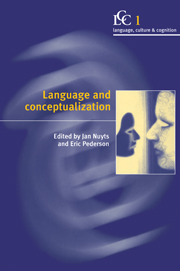Book contents
- Frontmatter
- Contents
- 1 Overview: on the relationship between language and conceptualization
- 2 From outer to inner space: linguistic categories and nonlinguistic thinking
- 3 Spatial operations in deixis, cognition, and culture: where to orient oneself in Belhare
- 4 Remote worlds: the conceptual representation of linguistic would
- 5 Role and individual interpretations of change predicates
- 6 Changing place in English and German: language-specific preferences in the conceptualization of spatial relations
- 7 Mapping conceptual representations into linguistic representations: the role of attention in grammar
- 8 Growth points cross-linguistically
- 9 On the modularity of sentence processing: semantical generality and the language of thought
- 10 The contextual basis of cognitive semantics
- 11 The cognitive foundations of pragmatic principles: implications for theories of linguistic and cognitive representation
- Subject index
- Index of names
5 - Role and individual interpretations of change predicates
Published online by Cambridge University Press: 05 June 2012
- Frontmatter
- Contents
- 1 Overview: on the relationship between language and conceptualization
- 2 From outer to inner space: linguistic categories and nonlinguistic thinking
- 3 Spatial operations in deixis, cognition, and culture: where to orient oneself in Belhare
- 4 Remote worlds: the conceptual representation of linguistic would
- 5 Role and individual interpretations of change predicates
- 6 Changing place in English and German: language-specific preferences in the conceptualization of spatial relations
- 7 Mapping conceptual representations into linguistic representations: the role of attention in grammar
- 8 Growth points cross-linguistically
- 9 On the modularity of sentence processing: semantical generality and the language of thought
- 10 The contextual basis of cognitive semantics
- 11 The cognitive foundations of pragmatic principles: implications for theories of linguistic and cognitive representation
- Subject index
- Index of names
Summary
Introduction: roles, individuals, and change predicates
We are only gradually coming to the full realization that grammatical constructions, like lexical items, not only have meaning but offer fascinating evidence about human conceptual structure. Lakoff, Langacker, Talmy, and a few others were ahead of the rest of us in insisting (even during a period when few linguists shared their views) that grammar is a meaningful system which necessarily reflects the conceptual structure it represents. But it still remains true that, while no language is more than very partially described in any framework, the set of cognitively oriented studies of grammatical constructions is as yet very small even relative to our limited conception of full description. There are probably many surprises ahead of us as we continue to analyse mappings of cognition onto grammar.
One particular problem that frequently arises in studies of both lexical and grammatical polysemy is the problem of how seriously to take a linguistic grouping or splitting of two related concepts. Does the use of a single form for multiple senses, or of separate forms for separate senses, have any connection with cognitive relations between the concepts referred to? For example, we may note that one language has separate conditional and topic markers, while another language has only one marker as the central representative of both these functions (see Haiman 1978).
- Type
- Chapter
- Information
- Language and Conceptualization , pp. 116 - 136Publisher: Cambridge University PressPrint publication year: 1997
- 12
- Cited by



